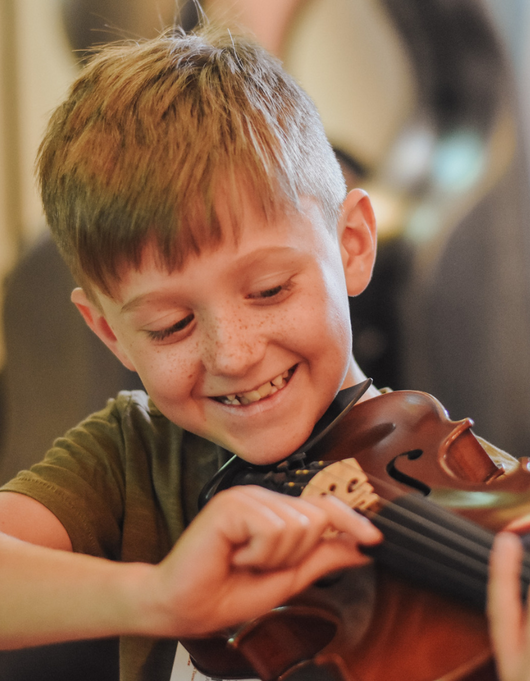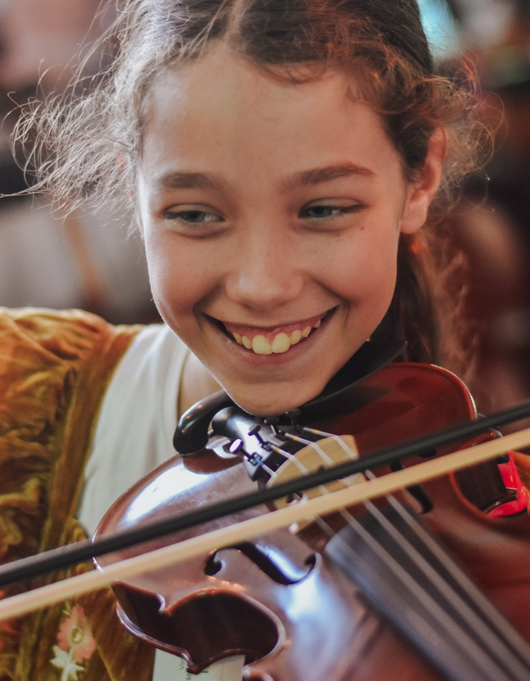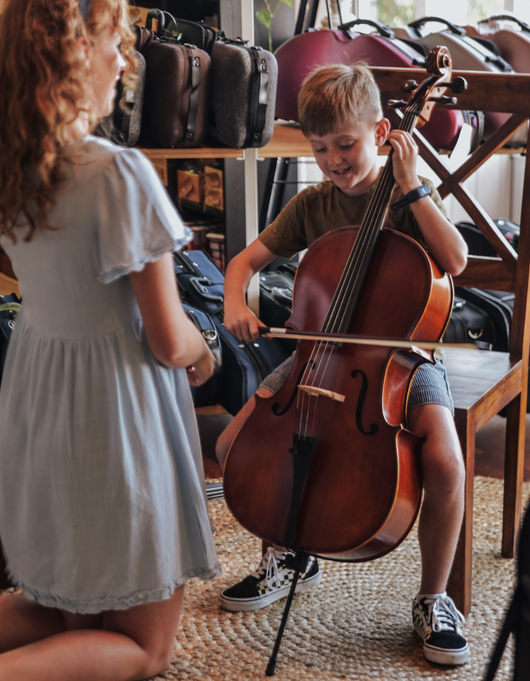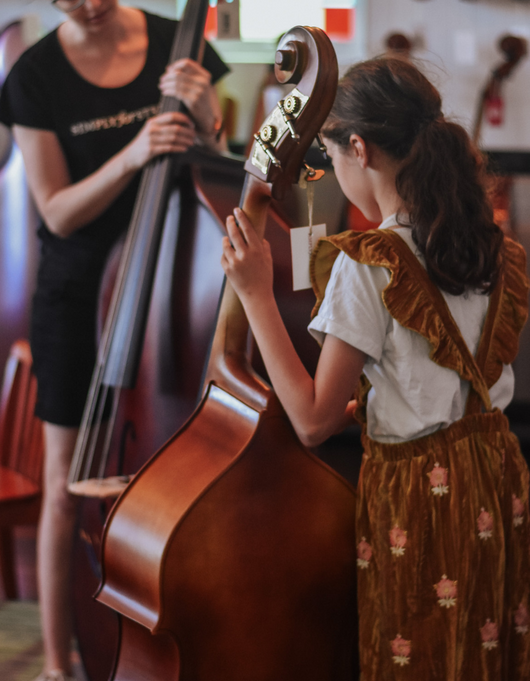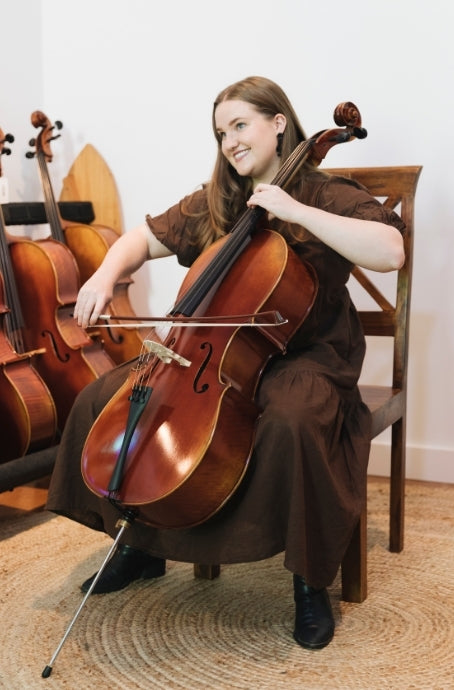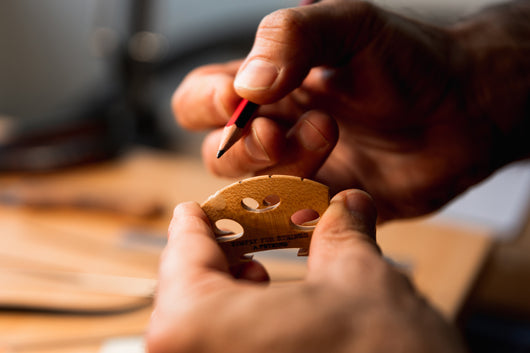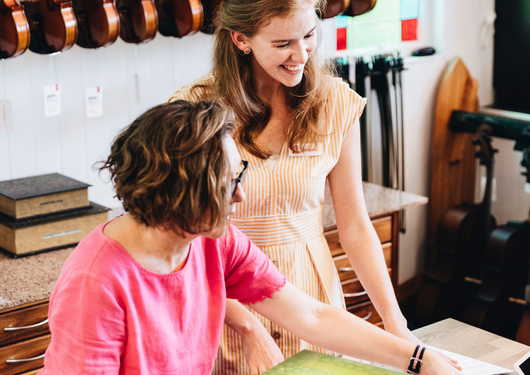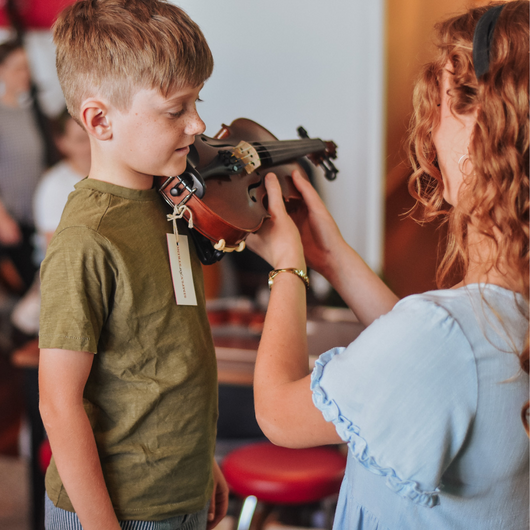Coffee with Composers: Neridah Oostenbroek
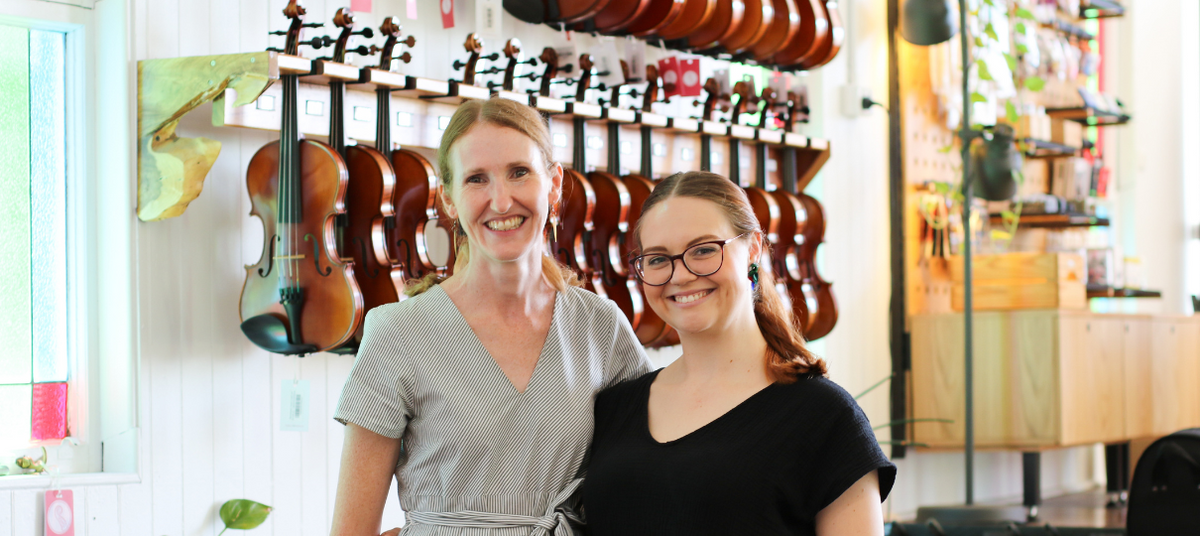
Here in Queensland, we are incredibly lucky to be the home of several leading composers and pedagogues. String educators including Stephen Chin, Loreta Fin, Timo Jarvela, Keith Sharp, Anne Svendsen and Neridah Oostenbroek are not only remarkable composers, but they are also regular visitors at our Red Hill store! We’re privileged to support these local composers and teachers, and have had a chat with them over coffee about their compositions, learning methods, and what lies ahead for them in 2024.
In our next interview of our new Coffee with Composers series, our Education Manager Jacqui sat down with the incredible Neridah Oostenbroek.
For over 20 years, Neridah has been teaching strings and classroom music in Brisbane. Inspired by her work as a string teacher, she started composing music for her ensembles, emphasising shared melodies to engage students and enhance their technical and musical abilities. Alongside her teaching, Neridah is a freelance violinist, regularly performing with the Queensland Symphony Orchestra and the Queensland Pops Orchestra. Jacqui sat down with Neridah before the school year kicked off to learn more about her compositions, her inspirations, and what is coming in 2024.
It’s lovely to sit down with you, Neridah! What are some of your plans for the year?
Well, I have so much from last year! I thought I would have more time, with fewer teaching days, to compose and do stuff, like clean the house. I have a 4, 7 and 9 year old - all boys. They’re starting to get a bit older now, so this year I should be able to spend more time composing. I also want to maintain my freelance work. The first half of 2023 was a little bit quiet but it was good because I was spending time with my youngest which was nice, but the second half was very busy with workshops here and performances there. Now I’m busy trying to prepare new music for publishing in 2024; here I am at the last minute, doing midnight scribbles!
I suppose it would be like a bit of a ‘bootcamp’ for you in terms of writing music over the New Year.
It’s always the same! The AUSTA Reading Day is coming up and they are always eager to try my pieces! They always ask me what new pieces I have but I tell them, "I can tell you how many I have on the go but I haven’t quite finished them all yet!" Hopefully, this year will be different!
Are you able to tell us more about your new works?
I’ve been writing some stuff not just for string ensemble. I’ve done some solo pieces for the recent AMEB violin and viola books, and I’ve been writing some stuff for the cello too! My son has been learning cello privately. He’s doing AMEB Grade 3 now, and while he’s learning, I’m learning. We’ve gotten through a lot of the basics, but now it’s all shifting - and that’s really tricky! There are so many other tricky techniques - especially bowing!
I totally agree! I love watching good cellists - they look amazing and so comfortable.
So effortless! Violin looks so unnatrual in comparison. I borrowed my sister’s cello to play some duets for Christmas with my son, and in 5 minutes or so, my bow arm was so dead! I told him I couldn’t do it and he said it was easy!
But yes, I’ve been trying to work on some different stuff. I’ve always been planning to write a book with violin pieces, but not like a method book, more like a graded book. The idea is that you can get it, play a few pieces in each ‘level’ and move through when you’re comfortable. I’ve been trying to do that for - oh, many years, maybe 5 or more! - so it’s a long-term project and we’ll get there eventually!
Of course you will! I just don’t know how you fit it all in!
My husband says the same - I only technically work 3 or 4 days, but I’m always filling the time. But, I love it. It doesn’t feel like a job! I just finished playing in Wagner’s ‘The Ring Cycle’ (with QSO) which was so much fun. So I do try to keep up the performing as well.
If you’re doing so many new compositions, and always busy with the kids, your composing time must be valuable! What do you do when you hit writer’s block?
Well, funny you say that, this actually happened the other day! I normally just come up with the tune and go from there. Sometimes it's hard with kids and noise around me, so I find if I’m walking, driving or in the shower, that's when I tend to come up with bits and pieces. I’ll get the ‘ah ha’ moment and I’m usually singing it. I’ll often be found singing into my phone when inspiration comes! Sometimes it's genius, but sometimes it’s rubbish. I just try and let the melody come.
One of the new works, which I think is finished which is exciting, was a bit easier than usual. I came up with the idea and it just worked! It’s not always like that though. A different work - where the writer’s block hit - I was trying to fix the middle part and I was getting very frustrated! I just couldn’t get it to work, I had the melody but I didn’t know what to do with the other parts. So I just left that and edited something else. Then yesterday morning, *clicks* "Oh! I can do that for the viola part, and change this around." That’s what I have to do - I have to just leave it. I can’t push through or force the music to work. When I try and force it, the music just sounds like rubbish.
Do you ever get chord progressions or harmony lines first?
I sing and then I hear it all in my head! As I’m singing it in my head it all fits together. I am trying to expand my harmonies to be less ‘traditional’ with some of my new works though, particularly after the Ring Cycles. I thought that I could try to incorporate some of those chordal movements and harmonies into my newer works. I’m trying to extend myself a little bit because often you can get bound when you see melodies in that chordal kind of way.
I think that’s partly why I struggle to compose - the harmony is always tricky for me!
I’ve been trying to also sit down at the piano and play my melody and experiment. Sometimes I’ll have the melody in my head, write it down, and then use the piano to try different harmonic movements to hear different possibilities. That’s been really good for me. My mum was a piano player so I learned as well so it’s quite natural for me, and you just end up somewhere.
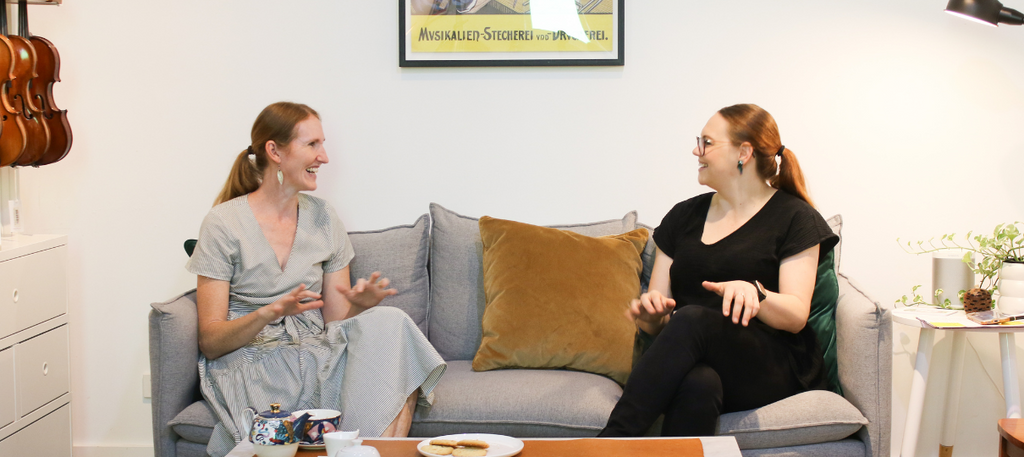
In terms of inspiration, do you have anyone or anything in particular that drives you to compose?
I started arranging a lot of music while I was teaching at a school. We had quite a mixed-ability ensemble - which is so common and remains so in my school! You’ve got kids who will start at the same time but progress at very different rates. I was writing 3rd violin parts, easy violin parts, 1st violin parts up the octave and so forth. I was also arranging a lot of pop tunes for my students as well - it was much harder to find repertoire. I did a lot of that arranging, and some movements of Mozart symphonies for string orchestra and drum kit.
Do remember the quartet Bond? I found my CD the other day and I thought, "Bring back the Bond!" There was so much less available digitally when I started composing and it was very hard to access. People would do their own arrangements and it was all hard copies. I still have stuff handwritten at home! I did write a few pieces early on, a lot of Irish and Celtic tunes and it all went from there.
I have been a member of AUSTA since I left university and I met some of our great Queensland composers like Loreta Fin, Keith Sharp and Timo Jarvela. They used to run composing workshops and mentoring. We used to submit our compositions, and get feedback - it was great! That was really helpful, having those mentors. I still play their music too and it was all you could get in schools for a long time. Works from overseas composers like Brian Balmages or Soon Hee Newbold were a lot harder to get a hold of. I used their works and studied their pieces a lot to see what they were doing from a composer’s and a teacher’s point of view. I also just wanted to write my own music for fun but also for my students to have fun playing them. There’s a lot of music that sounds beautiful but they’re not incredibly fun to play. Or, the inner parts will not have a lot to them, which means the kids are not really learning and they get bored! You have to keep them entertained - and it’s better educationally for them so that they can play a bit of melody, and listen to their peers. You have to think a lot about that when composing!
With all your experience, what would be some advice for early career teachers or young educators? Do you have any tips for selecting music?
I find it really tricky too! I was trying to find pieces for a balanced program but, you know, you can go online and have a look or listen, but it can be so easy to trawl through endlessly. I was chatting to one of my fellow teachers at a school and we just gave each other suggestions - they didn’t know some of the pieces I did and vice versa! You can kind of get in your own zone and especially if you’re the only instrumental music teacher in your school, it can be quite isolating. So do reach out to others!
Sometimes you can find some gems by looking through what you have already in your files. It is tricky though - even in my own ensemble. I have kids who have been learning for 3 or more years, some are practising a lot and others not so much. I’ve also got the year 3s who have only been learning for 12 months - and some of whom have been working really hard and others who are struggling. I did have a chamber group for more advanced players but it’s harder to find music that works for my full ensemble! Sometimes just writing really basic parts can help even some of the students feel like they can do it and take part.
You’ve mentioned you’re learning cello at the moment, and you’ve got violin and viola all sorted - do you find double bass hard to write for?
It’s probably the worst instrument for me to write for well. I used to have to teach double bass but luckily I have a specialist come into my schools now! I know the beginner basics and I play alongside my students, but it’s hard. There are so many positions and fingerings and I do struggle! I have to really think about it. It’s really hard and not pleasant to play music that isn’t idiomatic to your instrument. Some of Beethoven and Brahms is hard enough on violin, so I wouldn’t want to do that to my bassists! Just making sure too that the bass players don’t get completely bored - it’s such a fine line. I do a bit of writing for American publishers which can be hard too as they have specific rules and they like the cello and bass parts to be similar. Sometimes the bass players can be better than the rest of the ensemble which is equally tricky!
So when you prepare compositions for American publishers, do you create a ‘second version’ of your pieces or do you tend to write within those guidelines?
I normally just send them straight to my colleagues and they’ll look at them and they will say that these might work but these ones need work, fix up this part - it’s like a workshop! Sometimes I don’t have to do too much at all, but other times it can be a lot of editing!
We hope you found our conversation with Neridah as delightful as we did, gaining deeper insight into her remarkable passion for music education and composition. We're excited for the chance to delve into the creative journeys of more local composers in our upcoming interviews. Be sure to stay tuned for the next edition of Coffee with Composers, where we'll continue to uncover the captivating world of music creation with our exceptional local talents.



